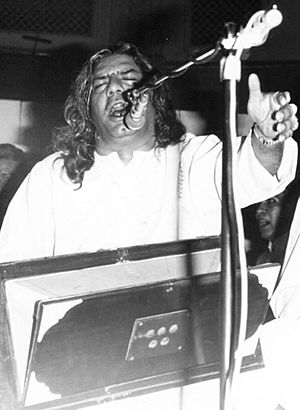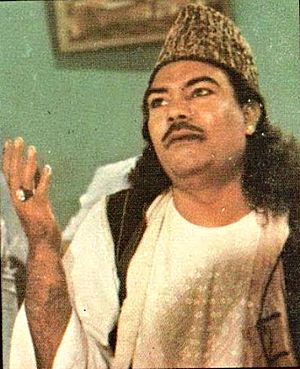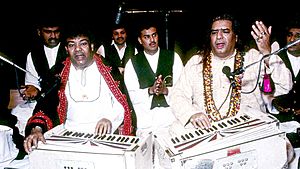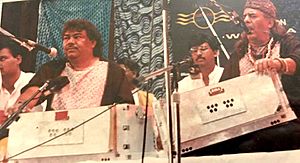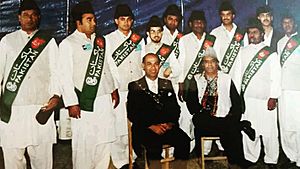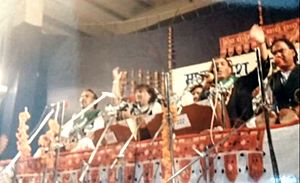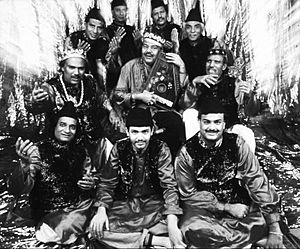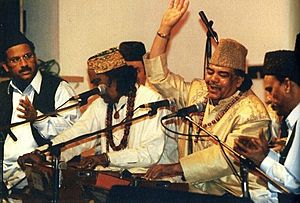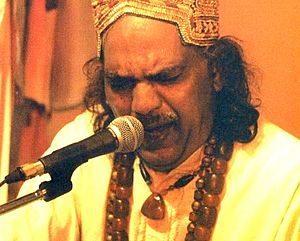Sabri Brothers facts for kids
Quick facts for kids
"Shahenshah-e-Qawwali"
The Sabri Brothers
Pride of Performance
|
|
|---|---|
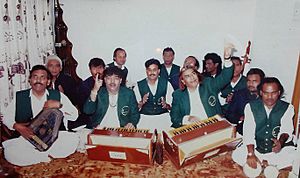
The Sabri Brothers & Ensemble
|
|
| Background information | |
| Origin | Kalyana, East Punjab, British India |
| Genres | Qawwali |
| Years active | 1956 – 2021 |
| Labels |
|
| Past members | Ghulam Farid Sabri (1956–94) Kamal Ahmed Khan Sabri (1956–2001) Maqbool Ahmed Sabri (1955–2011) Amjad Fareed Sabri (1982–2016) Mehmood Ghaznavi Sabri (1974 – 21 June 2021) |
The Sabri Brothers (Urdu: صابری برادران) were a famous music group from Pakistan. They were known for performing Sufi qawwali music. Qawwali is a type of devotional music, often sung in praise of God or Sufi saints. The Sabri Brothers are thought to be some of the best Sufi qawwali singers ever.
The group was led by two brothers, Ghulam Farid Sabri and Maqbool Ahmed Sabri. People often called them Shahenshah-e-Qawwali, which means "the King of Kings of qawwali." They were also known as "the roving ambassadors of Pakistan" because they traveled so much. Maqbool Ahmed Sabri started the band when he was just 11 years old. It was first called Bacha Qawwal Party. Later, his older brother Ghulam Farid Sabri joined, and he became the leader. The group then became known as The Sabri Brothers.
They were the first qawwali artists to perform in the United States and other Western countries. In 1975, they were also the first Asian artists to perform at New York's famous Carnegie Hall.
Contents
Meet the Sabri Brothers: Key Members
- Ghulam Farid Sabri (1930–1994): He was born in Kalyana, East Punjab. Ghulam Farid was the main singer and leader of the group until he passed away in 1994. He also played the harmonium.
- Maqbool Ahmed Sabri (1945–2011): Born in Kalyana, Maqbool was a leading member, main singer, and music composer. After his brother Ghulam Farid died, he led the group until his own death in 2011. He also played the harmonium.
- Kamal Ahmed Khan Sabri (1935–2002): He was a senior member who sang and played instruments like the swarmandal.
- Mehmood Ghaznavi Sabri (1949–2021): Born in Karachi, he was a senior member who sang and played bongo drums and tambourine. After Ghulam Farid's death, he became the second lead singer. He led the group after Maqbool Ahmed Sabri passed away.
- Amjad Fareed Sabri (1982–2016): He was Ghulam Farid Sabri's son. He started in the chorus and later became a supporting vocalist. He eventually led his own qawwali group.
Early Life and Musical Journey
The Sabri brothers learned music from their father, Inayat Hussain Sabri. He taught his sons both qawwali and Indian classical music. Ghulam Farid, Kamal Ahmed, and Maqbool also learned from other great music teachers. They studied poetry with Hazrat Hairat Ali Shah Warsi, who was their spiritual guide.
Ghulam Farid Sabri first performed in public in 1946 at a festival in Kalyana, India. His family moved to Karachi, Pakistan in 1947 after India was divided. Even when offered a partnership in a nightclub, Ghulam Farid said he only wanted to sing qawwali.
Maqbool Ahmed Sabri also showed musical talent when he was young. His school teacher noticed it and encouraged his father to teach him more. In 1955, at age eleven, Maqbool got a job singing at a theater in Karachi. He then formed his own qawwali group called Bacha Qawwal Party. Their first public show was in 1956.
Soon after, Ghulam Farid Sabri joined the group and became its leader. The group was first called Ghulam Farid Sabri Qawwal & Party. Later, it became Ghulam Farid Sabri – Maqbool Ahmed Sabri Qawwal & Party. In 1975, during their American tour, their promoter suggested a shorter name, so they became "The Sabri Brothers."
A Career of Music and Tours
Starting Out in Music
The Sabri Brothers began their career performing at Sufi shrines and private events. Their first official recording was released in 1958. It was an Urdu qawwali called "Mera Koi Nahi Hai Tera Siwa." This song later appeared in a Pakistani film in 1965.
Rising to Fame in the 1970s
The 1970s were a big time for the Sabri Brothers. They were the only qawwali group to have "first class" status on Pakistan Television. In 1970, the Pakistani government sent them to Nepal to perform at a royal wedding.
During the 1970s, they released many of their most famous qawwalis. These included "Bhar Do Jholi Meri Ya Muhammad" and "Tajdar-e-Haram." Several of their songs were also used in films.
In 1972, they performed a charity concert to help build a Pakistani Children School in Abu Dhabi. They also performed in England to raise money for earthquake relief in Pakistan.
The Sabri Brothers were the first qawwali artists to perform in the United States and Europe. They introduced qawwali to Western audiences at New York's Carnegie Hall in 1975. They also toured and performed in South Africa in 1975. They even donated money from their concerts there to help with famine relief.
In 1976, they performed at the Royal Albert Hall in London. In 1977, they toured India, and many Bollywood stars attended their concerts. They also recorded an album for the UNESCO Collection of Traditional Music.
The 1980s: More Tours and Hits
In 1981, the Sabri Brothers performed in Amsterdam. In 1982, their famous qawwali "Tajdar-e-Haram" was featured in the film Sahaaray. They also performed for charity to help build a hospital near Karachi Airport.
In 1983, they recorded an album to celebrate the Golden Jubilee of Prince Aga Khan. The money from this album was given to Aga Khan Hospital. In 1985, they raised money for the Bangladesh Flood Relief Fund.
Maqbool Ahmed Sabri released a solo album of ghazals in 1985, which was very popular. In 1988, he recorded a qawwali song for an Indian movie. In 1989, the Sabri Brothers performed at the WOMAD festival in the UK and France. They also recorded the album Ya Habib, which became one of their biggest hits.
The 1990s: Challenges and Continued Success
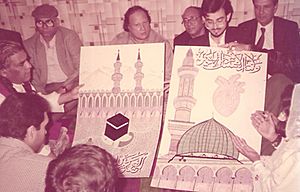
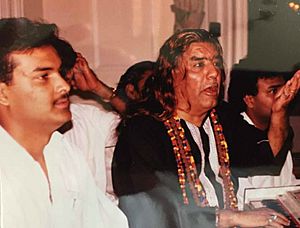
In the 1990s, the Sabri Brothers continued to perform worldwide. In 1991, Ghulam Farid Sabri toured Europe. Maqbool Ahmed Sabri also toured South Africa. In 1992, they toured Australia and performed to raise money for the Shaukat Khanum Memorial Cancer Hospital.
In April 1994, Ghulam Farid Sabri sadly passed away from a heart attack. Maqbool Ahmed Sabri was very sad but continued their mission. After Ghulam Farid's death, Maqbool became the sole leader, with Mehmood Ghaznavi Sabri as the second lead singer.
In 1995, Maqbool Ahmed Sabri had a serious accident but recovered. In 1996, the Sabri Brothers released another hit album called Ya Mustapha. In 1997, they performed again at the Royal Albert Hall for the Prince of Wales. They also performed at the Symphony Hall, Birmingham.
In 1998, they toured Australia and performed at the Sydney Opera House. In 1999, they participated in the Voices of God festival in Morocco.
The 2000s and Beyond
In 2000, the Sabri Brothers performed in Germany. In 2001, Kamal Ahmed Sabri, the second oldest brother, passed away. Later that year, the group performed in Moscow.
In 2005, Maqbool Ahmed Sabri performed in India and received the Tansen Samman Award. He also re-recorded some of their old hit qawwalis in 2006. The Sabri Brothers continued to tour, performing in Russia in 2007 and India in 2008.
Maqbool Ahmed Sabri continued performing until his health declined. He passed away in South Africa in 2011 due to heart problems. He was buried near his elder brother, Ghulam Farid Sabri.
After Maqbool's death, the youngest brother, Mehmood Ghaznavi Sabri, led the group. He organized many concerts in Europe to raise money for the Namal Institute in Pakistan. Mehmood Ghaznavi Sabri passed away on June 21, 2021. With his death, the original Sabri Brothers group came to an end. However, other family members and students continue to perform qawwali, carrying on their amazing musical legacy.
Musical Styles and Friendly Rivalries
Many people believe the Sabri Brothers were very creative with their instruments. They focused on singing Hamd (praise of God), Naat (praise of the Holy Prophet), and Manqabat (praise of holy people and saints).
In the 1970s, there was a friendly rivalry between the Sabri Brothers and another great Sufi singer, Aziz Mian. The Sabri Brothers released their hit "Bhar do Jholi Meri," while Aziz Mian released "Main Sharaabi." The rivalry became more playful when the Sabri Brothers released a song called "O sharabi, chord de peena" (meaning "O drunkard, stop drinking"). This song became very popular.
Aziz Mian quickly responded with his own song, "Haaye kambakht Tu Ne Pi Hi Nahi" (meaning "O Unfortunate, you never drank!"). In his song, Mian suggested the Brothers were too traditional. The Sabri Brothers replied with "Saqia Aur Pila," focusing on their deep spiritual connection. This musical exchange was very popular, selling millions of records for both groups. Even with this musical competition, the Sabri Brothers and Aziz Mian remained good friends.
The Sabri Brothers' Lasting Legacy
- The Sabri Brothers had the special honor of performing in Madina Sharif, near the holy mosque Al-Masjid an-Nabawi.
- They were very skilled at singing in the Persian language. They loved performing the poetry of Amir Khusrow.
- Famous Sufi singer Abida Parveen learned from the Sabri Brothers. She has said they inspired her, and she learned the song "Man Kunto Maula" from them.
- In 2003, British singer Sami Yusuf covered their hit song Ya Mustafa. He said the Sabri Brothers' music was full of spirituality and peace, inspiring him deeply.
- In 2006, Amatullah Armstrong Chishti wrote a book called The Lamp of Love – Journeying with the Sabri Brothers. It explored Sufi saints and the art of qawwali.
- In 2008, an underpass in Karachi was named after Ghulam Farid Sabri.
- Coke Studio Season 8 paid tribute to the Sabri Brothers. Singer Atif Aslam performed their famous song "Tajdar-e-Haram."
- Their song "Bhar do Jholi Meri Ya Muhammad" was featured in the 2015 Bollywood movie Bajrangi Bhaijaan.
- "Tajdar-e-Haram" was also featured in the 2018 Bollywood movie Satyameva Jayate.
- In 2021, singer Ali Zafar released his own version of "Balaghal Ula Bi Kamaalihi" as a tribute to the Sabri family.
Awards and Special Recognition
- Pride of Performance Award: The President of Pakistan gave this award to the entire Sabri Brothers group in 1978.
- Spirit of Detroit Award: The United States government gave this award to both Ghulam Farid Sabri and Maqbool Ahmed Sabri in 1981.
- Khusro Rang: The Raag Rang Society of India honored Ghulam Farid Sabri and Maqbool Ahmed Sabri in 1980.
- Bulbul E Pak O Hind: The Shrine of Nizamuddin Auliya gave this title to Ghulam Farid Sabri and Maqbool Ahmed Sabri in 1977.
- Charles de Gaulle Award: Charles de Gaulle honored Ghulam Farid Sabri and Maqbool Ahmed Sabri in 1983.
- Doctorate Degree: The University of Oxford awarded a doctorate degree to the Sabri Brothers for their hit record Shikwa Jawab E Shikwa.
- Tansen Samman (India): The government of Madhya Pradesh awarded this to Maqbool Ahmed Sabri in 2005.
Sabri Brothers' Music in Films and TV
Their qawwalis were featured in many films and television series:
- "Mera Koi Nahi Hai Tere Siwa" in the 1965 Pakistani film Ishq-e-Habib
- "Mohabbat Karne Walo Hum Mohabbat Iss Ko Kehte Hai" in the 1970 Pakistani film Chand Suraj
- "Aaye Hai Tere Dar Pe Toh Kuch Le Ke Jayen Ge" in the 1972 Pakistani film Ilzam
- "Baba Farid Sarkar" in the 1974 Pakistani Punjabi film Sasta Khoon Mehenga Paani
- "Bhar Do Jholi Meri Ya Muhammad" in the 1975 Pakistani film Bin Badal Barsaat
- "Teri Nazr-e-Karam" in the 1976 Pakistani film Sachaii
- "Mamoor Ho Raha Hai" in the 1977 Pakistani film Dayar-e-Paighambran
- "Aftab E Risalat" in the 1979 Indian Hindi film Sultan-e-Hind Khwaja Garib Nawaz (RA)
- "Tajdar-e-Haram" in the 1982 Pakistani film Sahaaray
- "Tere Dar Ko Chord Chale" (solo by Maqbool Ahmed Sabri) in the 1988 Indian film Gangaa Jamunaa Saraswati
- "Tere Ishq Nachaya" in the 1975–1976 Pakistan Television Corporation series Aik Mohabbat Sau Afsanay
Discography: Albums and Concerts
Concert Films
- 1975 Qawwali, Music from Pakistan – Live in America
- 1981 Live in England – Vol 1
- 1988 Live in England – Vol 2
- 1988 Live in England – Vol 3
- 1988 Live in England – Vol 4
- 1986 Qawali – The Sabri Brothers (Live at Shrine of Hazrat Abdullah Shah Ghazi)
- 1992 Sabri Brothers Live in India (SAARC)
Albums
- 1970 Ghulam Farid Maqbool Sabri Qawal And Party – O' Laaj Mori Rakh (Columbia)
- 1970 Devotional Songs (EMI Pakistan)
- 1970 Qawwali – Ya Mohammad Nigah-e-Karam (EMI Pakistan)
- 1970 Qawwali – Mere Khoon e Arzoo Ko (EMI Pakistan)
- 1971 Ghulam Farid Maqbool Sabri Qawal And Party – Balaghal Ula Be Kamalehi (EMI Pakistan)
- 1972 Ghulam Farid Maqbool Sabri Qawal And Party – Aaye Ri More Angna Moinud Din (Angel Records)
- 1972 Qawwali – Karam Asiyo Par Ho (EMI Pakistan)
- 1974 Nazrana E Aqidat (Angel Records)
- 1975 Ghulam Farid Maqbool Sabri Qawal And Party – Sab Se Bara Darbar-E-Madina (EMI Pakistan)
- 1975 Ghulam Farid Maqbool Sabri Qawal And Party – Teri Surat Nigahon Men (His Master's Voice)
- 1975 Ghulam Farid Maqbool Sabri Qawal And Party – Mohammad Ki Chatai Ne Bhi (Odeon)
- 1975 Ghulam Farid Maqbool Sabri Qawal And Party – Na Samjho Khak Ka Putla (Odeon)
- 1975 Sabri Brothers – More Ghar Aj Mohammed Aaye (Odeon)
- 1975 Sabri Brothers – Ya Mohammad Noor-e-Mujasim (Angel Records)
- 1976 Deewani Kawaja Ki Deewani / O Sharabi Chod De Peena (EMI Pakistan)
- 1977 Sabri Brothers – Aaye Hain Woh (Shalimar Recording Company Limited)
- 1977 Ghulam Farid Maqbool Sabri Qawal And Party – Ya Sahebal Jamal (Odeon)
- 1977 Pakistan : The Music of Qawwal (UNESCO)
- 1977 Ghulam Farid Maqbool Sabri Qawal And Party – Bhar Do Jholi Meri Ya Mohammed (Angel Records)
- 1978 Qaw Allis Vol. 6 – Gulam Shabri Live Recording in S. Africa (Ashirwad)
- 1978 Kawwali Musicians from Pakistan (Arion)
- 1978 Qawwali – Sufi Music From Pakistan (Nonesuch)
- 1979 Music of Pakistan – Qawwali – Live in Concert (Vinyl LP Record, 1979)
- 1979 Sabri Brothers Qawwal (EMI Pakistan)
- 1979 Shikwa Jawab Shikwa (EMI Pakistan)
- 1980 Greatest Qawwali's of Sabri Brothers (EMI Pakistan)
- 1980 Latest Qawwalis from Sabri Brothers (EMI Pakistan)
- 1980 Sabri Brothers in Concert – Vol.1–3 (EMI Pakistan)
- 1980 Sabri Brothers Live Concert Vol −16 (EMI Pakistan)
- 1980 Sabri Brothers – Mehfil-E-Programme Vol −17 (EMI Pakistan)
- 1982 Jhoot Ke Paon Nahin Hain (EMI Pakistan)
- 1982 Sabri Brothers – Ghulam Farid & Maqbool Sabri (EMI Pakistan)
- 1982 Maqbool Ahmed Sabri – Urdu Ghazal (His Master's Voice)
- 1983 New Qawwali's By Sabri Brothers (EMI Pakistan)
- 1983 Nazr-e-Shah Karim (AEA)
- 1984 Jogan Daata Di (EMI Pakistan)
- 1985 Hits of Sabri Brothets (EMI Pakistan)
- 1985 Awargi (CBS)
- 1986 Ya Muhammad Nigahe Karam (EMI Pakistan)
- 1987 Sur Bahar " Amir Khusro " (EMI Pakistan)
- 1988 Shan-E-Aulia (EMI Pakistan)
- 1988 Maqbool Ahmed Sabri – Tere Ghungroo Toot Gaye Toh Kya – Ghazals (EMI Pakistan)
- 1988 Live at Allah Ditta Hall (UK Tour)
- 1990 Sabri Brothers New Qawwali's 1990 (EMI Pakistan)
- 1990 The Music of the Qawwali (Auvidis, UNESCO)
- 1990 Ya Habib (Real World)
- 1993 Qawwali Masterworks (Piranha)
- 1993 Doolha Heryale [Doolha Hariyaale] (Shalimar Recording Company)
- 1993 Bangai Baat Unka Karam Ho Gaya Vol 2 - (Oriental Strar Agencies)
- 1993 Pyar Ke Morr Live in Concert (Oriental Star Agencies)
- 1993 La Ilah Ki Boli Bol (EMI Pakistan)
- 1994 Shehanshah-e-Qawwali Ki Yaad Mein – Vol.1–2 (EMI Pakistan)
- 1994 Savere Savere (Oriental Star Agencies)
- 1994 La Elah Ki Boli Bol (Oriental Star Agencies)
- 1994–97 Greatest Hits of Sabri Brothers, Vol.1–3 (Sirocco)
- 1994 Milta Hai Kya Namaz Mein – Live in UK (Oriental Star Agencies)
- 1995 Maqbool Ahmed Sabri – Aawargi Vol 3 (Eastern Music Productions)
- 1996 Jami (Piranha)
- 1996 Ya Mustapha [Ya Mustafa] (Xenophile)
- 1996 Allah Baqi (Oriental Star Agencies)
- 1996 Ae Mere Hamnasheen (Oriental Star Agencies)
- 1996 Khawaja Ki Diwani – Live in Europe 1981 (Oriental Star Agencies)
- 1996 Tajdar-e-Haram (Oriental Star Agencies)
- 1997 Nazan Hai Jis Pai Husn (Oriental Star Agencies)
- 1997 Maikadah – Live in Concert (Oriental Star Agencies)
- 1997 Balaghul Ula Bekamalehi (Oriental Star Agencies)
- 1998 Hazir Hain (Oriental Star Agencies)
- 1999 Madeena Na Dekha (Sonic Enterprises)
- 2000 Madina Mujhe De De (Tips Music Company)
- 2001 Ya Raematal Lilalmin (Oriental Star Agencies)
- 2002 Dar Pe Deewane Aaye Hai (Tips Music Company)
- 2003 Bindia Lagaon Kabhi (Oriental Star Agencies)
- 2003 Jhoole Jhoole Ji Mohammad (Oriental Star Agencies)
- 2003 Live in Moscow Diwani (Long Arms Record)
- 2003 Tasleem Live At Royal Tropical Institute, Amsterdam, 1981 (PAN Records)
- 2004 Aaj Rang Hai Ri (Tips Music Company)
- 2004 Rabb E Akbar (Tips Music Company)
- 2005 Jitna Diya Sarkar Ne Mujhko (Oriental Star Agencies)
- 2005 Mangte Hai Karam Unka (Oriental Star Agencies)
- 2006 Mera Koi Nahi Hai Tere Siwa – Recreated Versions By Maqbool Ahmed Sabri (SB Enterprises)
- 2007 Ajmer Ko Jana Hai (Oriental Star Agencies)
- 2007 Posheeda Posheeda – Live in Concert UK (Oriental Star Agencies)
- 2007 Piya Ghar Aya (Oriental Star Agencies)
- 2016 Showcase Southasia, Vol.18 – Sabri Brothers (EMI Pakistan)
- Contributing artist
- 1965 Ishq E Habib & Eid Mubarak – Movie Tracks (Columbia & EMI Pakistan)
- 1975 Devotional Qawwalis From Films (EMI Pakistan)
- 1987 Sher E Yazdaan Ali Ali (EMI Pakistan)
- 1987 Maikhana – Aziz Miyan & Sabri Brothers (EMI Pakistan)
- 1991 Music in Asian Islam (Recordings And Liner Notes, MCM)
- 1996 The Rough Guide to the Music of India and Pakistan (World Music Network)
- 2006 The Best of Sabri Brothers & Nusrat Fateh Ali Khan (EMI Pakistan)
- 2012 Great Works of Amir Khusro – Vol 1 & 2 (Virgin Records, India)
- 2014 Essential Sufi Meditations – Famous Songs of Pakistan with the Masters Nusrat Fateh Ali Khan, Sabri Brothers, And Rahat Fateh Ali Khan (Celebration Sounds)
See also
- Ghulam Farid Sabri
- Maqbool Ahmed Sabri
- Amjad Sabri
- List of Pakistani music bands
 | Toni Morrison |
 | Barack Obama |
 | Martin Luther King Jr. |
 | Ralph Bunche |


